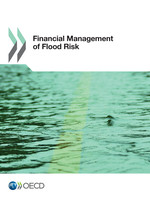Financial management of flood risk
 Disasters present a broad range of human, social, financial, economic and environmental impacts, with potentially long-lasting, multi-generational effects. The financial management of these impacts is a key challenge for individuals and governments in developed and developing countries. G20 Finance Ministers and Central Bank Governors and APEC Finance Ministers have recognised the importance and priority of disaster risk management strategies and, in particular, disaster risk assessment and risk financing. The OECD has supported the development of strategies for the financial management of natural and man-made disaster risks, under the guidance of the OECD High-Level Advisory Board on Financial Management of Large-scale Catastrophes and the OECD Insurance and Private Pensions Committee. This work has included the elaboration of an OECD Recommendation on Good Practices for Mitigating and Financing Catastrophic Risks and a draft Recommendation on Disaster Risk Financing Strategies The Financial Management of Flood Risk extends this work by applying the lessons from the OECD’s analysis of disaster risk financing practices and the development of its guidance to the specific case of floods.
Disasters present a broad range of human, social, financial, economic and environmental impacts, with potentially long-lasting, multi-generational effects. The financial management of these impacts is a key challenge for individuals and governments in developed and developing countries. G20 Finance Ministers and Central Bank Governors and APEC Finance Ministers have recognised the importance and priority of disaster risk management strategies and, in particular, disaster risk assessment and risk financing. The OECD has supported the development of strategies for the financial management of natural and man-made disaster risks, under the guidance of the OECD High-Level Advisory Board on Financial Management of Large-scale Catastrophes and the OECD Insurance and Private Pensions Committee. This work has included the elaboration of an OECD Recommendation on Good Practices for Mitigating and Financing Catastrophic Risks and a draft Recommendation on Disaster Risk Financing Strategies The Financial Management of Flood Risk extends this work by applying the lessons from the OECD’s analysis of disaster risk financing practices and the development of its guidance to the specific case of floods.
Related Content
- Double trouble? assessing climate physical and transition risks for the Moroccan banking sector
- Building financial resilience to climate impacts: a framework for governments to manage the risks of losses and damages
- Assessing financial risks from physical climate shocks: a framework for scenario generation
- Water and federalism: working with states for water security
- Scaling up index-based flood insurance (IBFI) for agricultural resilience and flood-proofing livelihoods in Developing Countries
- Fiscal resilience to natural disasters: lessons from country experiences
